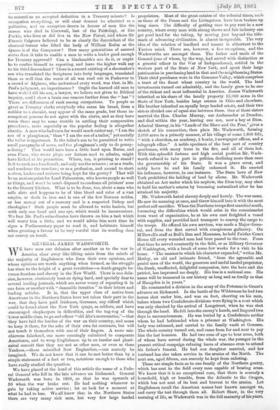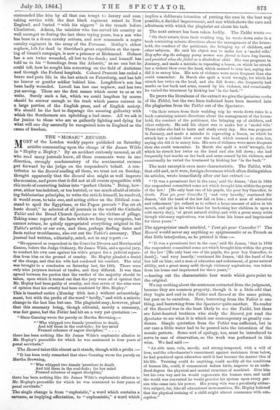GENERAL JAMES WADSWORTH.
WE have seen one delusion after another as to the war in America clear away like lifting mists from the minds of the majority of Englishmen who form their own opinions, and whose opinions arc worth anything when formed, as the struggle has risen to the height of a great revolution—a death-grapple be- tween freedom and slavery in the New World. There is one delu- sion, however, obstinately bent on dying hard, and specially dear to several leading journals, which are never weary of repeating it in one form or another with " damnable iteration " in their letters and
leading articles. It is, that the upper class of native-born Americans in the Northern States have not taken their part in the war, that they have paid Irishmen, Germans, any riffraff which ' could be found about the New York quays, as soldiers, and have encouraged shopkeepers in difficulties, and the tag-rag of the lower middle class, to go and officer "old Abe's mercenaries,"—that they have laid the burden of the war on their country, and mean to keep it there, for the sake of their own fat contracts, but will mot touch it themselves with one of their fingers. A more mis- chievous falsehood, one more cunningly calculated to exasperate Americans, and to wrap Englishmen up in an insular and phari- saical conceit that they are not as other men, or even as these Yankees,—these miscalled New Englanders,—can scarcely be imagined. We do not know that it can be met better than by a simple statement of a fact or two, notorious enough to those who have really studied the question.
We have placed at the head of this article the name of a Fede- ral General who fell in the late advance on Richmond. General Wadsworth was born in 1808, so that he was upwards of 50 when the war broke out. He had nothing whatever to gain by taking active service ; let us look for a moment at what he had to lose. We all know that in the Northern States there. are very many rich men, but very few large landed proprietors. Most of the great estates of the colonial times, such as those of the Penns and the Livinastons. have been broken up long since. The difficulty of getting men to pay rent in a new country, where every man with strong thews and fair industry can get good land for the taking, by moving just beyond the tide- mark of advancing civilization, is almost in.mperable. The very idea of the relation of landlord and tenant is abhorrent to the Yankee mind. There are, however, a few exceptions, and the
Wadsworths are amongst these. The father and uncle of the General (one of whom, by the way, had served with distinction as a general officer in the War of Independence), settled in the western part of the State of New York, and spent their large patrimonies in purchasing land in that and the neighbouring States. Their chief purchases were in the Genessee Valley, which comprises a tract of the finest wheat country in the world. The land investments turned out admirably, and the family grew to be one of the richest and most influential in America. James Wadsworth inherited as his share of the family property 15,000 acres in the State of New York, besides large estates in Ohio and elsewhere. His brother inherited an equally large landed estate, and their two sisters divided one of equal size between them. One of these sisters married the Hon. Charles Murray, our Ambassador at Dresden, and died within the year, leaving one son, now a boy at Eton. Admiral Murray, in his "Lands of the Slave and the Free," gives a sketch of his connection, then plain Mr. Wadsworth, farming 2,000 acres in a princely manner, of his village of some 1,800 folk, " with 4 churches, an academy, 2 banks, 2 newspaper offices, and a telegraph office." A noble specimen of the best sort of country gentleman, with many irons in the fire, and all of them hot. With this splendid fortune and high social position Mr. Wads- worth refused to take part in politics, declining more than once the governorship of his State. It was a grave error, and nobly have he and his family redeemed it. He exerted his influence, however, in one instance. The State laws of New York prohibited the holding of land by aliens. Mr. Wadsworth obtained an Act under which his nephew, the Eton boy, may elect to hold his mother's estates by becoming naturalized after he has attained his majority.
Mr. Wadsworth hated slavery deeply and keenly. The war came. He saw its meaning at once, and threw himself into it with the most perfect self-sacrifice. When the Northern troops first marched south, foreseeing the difficulties which would arise in the commissariat from want of organization, he at his own cost freighted a vessel with supplies, and provided land transport to convey the cargo to the troops. He offered his own services, was made a Major-Gene- ral, and from the first served with conspicuous gallantry. On M'Dowell's staff at Bull's Run and Manassas, he held Fairfax Court House till every wounded man had been passed to the rear. From that time he served constantly in the field, or as Military Governor of Washington, with a break of some few weeks for a visit to- his home. " The mannerin which his character expanded," writes Mr. Motley, an old and intimate friend, " from the agreeable and genial man of the world, the generous and useful landed proprietor, the frank, unaffected, delightful companion, into the hero and the patriot, has impressed me deeply. His loss is a national one. His name will be treasured in our history as long and as fondly as that of Hampden is in yours."
He commanded a division in the army of the Potomac in Grant's advance on Richmond. In the battle of the Wilderness he had two horses shot under him, and was on foot, cheering on his men, before whom two Confederate divisions were flying in a rout which was only checked by the arrival of Longstreet, when he was shot through the head. He fell into the enemy's hands, and lingered two days in unconsciousness. He was buried by a Confederate soldier whom he had befriended when a prisoner at Washington. His body was exhumed, and carried to the family vault at Geneseo. The whole country turned out, and came from far and near to pay him the last honours. He had two sons of age to bear arms, both of whom have served during the whole war, the younger in the present critical campaign refusing leave of absence even to attend his father's funeral. He had one daughter married, and her husband has also taken service in the armies of the North. The next son, aged fifteen, can scarcely be kept from enlisting.
These are simple facts as to one family of the Northern gentry, which has sent to the field every man capable of bearing arms. We know that it is no exceptional case, that there is scarcely a household, high or humble, from the Atlantic to the Oregon, which has not sent of its best and bravest to the armies. Let Englishmen recall the American names best known amongst us, and carry the test through them all. Robert Shaw, in the very morning of life, as Wadsworth was in the full maturity of his years,
surrounded like him by all that can tempt t3 luxury and ease, taking service with the first black regiment raised in New England, and buried " with his niggers " in the trench before Charleston. Adams, the minister who has served his country so well amongst us during the last three trying years, has a son who has been in a dozen cavalry actions, and now commands a negro cavalry regiment in the army of the Potomac. Motley's eldest nephew, left for dead in Sheridan's great expedition at the open- ing of Grant's campaign, is now a prisoner at Richmond. Holmes has a son twice wounded, all but to the death ; and himself has told us in his " Soundings from the Atlantic," as no one but he could tell, how he sought him sorrowing on the field of Antietam and through the Federal hospitals. Colonel Prescott has ended a brave and pure 14 in the last attack on Petersburg, and has left no braver or gentler soldier behind him. Longfellow's son has been badly wounded. Lowell has lost one nephew, and has two yet serving. These are the first names which occur to us as we write. Surely such a list, which we could lengthen by scores, should be answer enough to the trash which passes current in a large portion of the English press, and of English society. We should be the last to disparage the amazing gallantry with which the Southerners are upholding a bad cause. All we ask is for justice to those who are as gallantly fighting and dying for what will one day assuredly be recognized here in England as the cause of freedom.































 Previous page
Previous page